|
|
|
Sort Order |
|
|
|
Items / Page
|
|
|
|
|
|
|
| Srl | Item |
| 1 |
ID:
167242
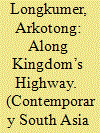

|
|
|
|
|
| Summary/Abstract |
The aim of this paper is to examine the story of the American Baptists and how their mission activities in the Naga Hills District (1871–1955) have impacted upon present day politics in the Indian state of Nagaland. Baptists make up nearly 95% of the current Naga population in Nagaland. The paper will investigate the relationship between the Baptist mission’s philosophy on education, Christian conversion and the subsequent rise of a sense of ‘national community’ amongst the Nagas. Although the primary motivation for the American missionaries was to convert, the British administrators also thought that introducing Christianity would prevent influence on these tribes from Hindu and Muslim groups. Thus began Christianity’s part in a developing framework for resistance in this region, raising significant questions with regard to Christianity’s persistence as a form of political articulation in contemporary Nagaland. This political articulation, I suggest, is related to a greater sense of agency brought about by Christianity and Missionary activities in the fields of education and print. The American Baptist Foreign Mission Society (ABFMS) was at the forefront of these changes.
|
|
|
|
|
|
|
|
|
|
|
|
|
|
|
|
| 2 |
ID:
188959
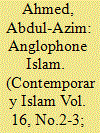

|
|
|
|
|
| Summary/Abstract |
The field of ‘Islamic Studies’, like ‘Religious Studies’, is a broad-church. It includes a number of epistemological and ontological positions associated with a range of disciplines. The diversity inherent in a category such as ‘Islamic Studies’ is challenged by a bifurcation of two predominant approaches found within the field, the textual and the sociological. In this paper, I seek to propose a new concept for contemporary Islamic studies, that of Anglophone Islam, which will allow a broader range of scholarship to be contextualised in relation to each other. The concept also opens a new set of questions to be explored by scholars of Islamic studies. It will be of particular interest to scholars involved in contemporary Islamic studies in fields such as American Muslim studies, British Muslim studies and European Muslim studies, but will also have utility to theological, historical and philosophical scholars of Islam working in the English language.
|
|
|
|
|
|
|
|
|
|
|
|
|
|
|
|
| 3 |
ID:
170176
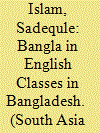

|
|
|
|
|
| Summary/Abstract |
In South Asia, the use of students’ first language while studying English as a second or further language remains a matter of considerable interest and contention. This topic deserves further attention by teachers and researchers in efforts to make the educational and learning experience in often multilingual contexts as productive as possible. This short article addresses the ongoing debates in Bangladesh around the use of the Bangla language while teaching English classes at higher secondary (HSC) level. Presently, Bangla is generally discouraged on pedagogical grounds in the teaching and learning of English. This ethnographic study investigates the attitudes of Bangladeshi HSC level students towards the use of Bangla in English classes. The results indicate positive attitudes among the students towards using Bangla in the learning of English and suggest the necessity of revising the official negative approach.
|
|
|
|
|
|
|
|
|
|
|
|
|
|
|
|
| 4 |
ID:
140069
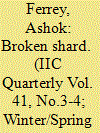

|
|
|
| 5 |
ID:
101020
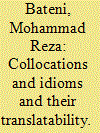

|
|
|
|
|
| Publication |
2010.
|
| Summary/Abstract |
A collocation can be defined as a sequence of words which co-occur more than would be expected by chance. Collocations impose constraints on how words can be used together. An idiom is an expression whose meaning cannot be deduced from the literal definitions and the arrangement of its parts, but refers instead to a figurative meaning that is known only through common use. In this paper I will attempt to expand on these notions. For further clarification, I will compare and contrast some examples from English and Persian.
|
|
|
|
|
|
|
|
|
|
|
|
|
|
|
|
| 6 |
ID:
171196
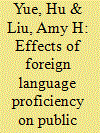

|
|
|
|
|
| Summary/Abstract |
What explains public attitudes towards a former aggressor state? Conventional wisdom would suggest the prevalence of negative sentiments rooted in historical hatred. In this article we contend that when individuals are proficient in a foreign language—e.g. a lingua franca—they have an alternative channel through which they are exposed to positive narratives put forth by other parties regarding the former aggressor state. And as a result, their attitudes towards the former aggressor state are more positive than those held by their linguistically limited counterparts. To test our argument, we focus on public attitudes towards the Japanese in Mainland China, Singapore, and Taiwan—three Chinese-ethnic majority political units that experienced Japanese aggression leading up to and during World War II. Using survey data, we demonstrate that individuals who are proficient in the English language are much more likely to hold positive attitudes of the Japanese. These results are robust even when we consider whether some individuals are predisposed to being cosmopolitan; whether some individuals have more opportunities to learn English; and whether the linguistic effects are symptomatic of American soft power.
|
|
|
|
|
|
|
|
|
|
|
|
|
|
|
|
| 7 |
ID:
084411
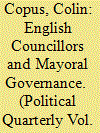

|
|
|
| 8 |
ID:
117502
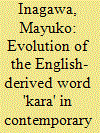

|
|
|
|
|
| Publication |
2012.
|
| Summary/Abstract |
Language is not static, but is constantly changing. This study explores the linguistic evolution of one loanword in contemporary Japanese over place and time using a corpus-driven approach, with special reference to word usage and frequency. Taking the English-derived word kara, which corresponds to 'colour' in English, as an example, it aims to identify how and to what extent (a) the application and implications of kara in Japanese have diverged from its counterpart in English (i.e., over space) and (b) the frequency and usage of English-derived words in the Japanese language changed over the 15-year period between 1991 and 2006 (i.e., over time). These goals are achieved through an analysis of corpora consisting of Mainichi shimbun articles published in 1991 and 2006. The study's main argument is that both place and time are significant factors in language change and dynamic mechanisms involving both the donor and receiver languages are at work in creating culturally-specific usages of the word. The study also discusses that such change involves both linguistic and extra-linguistic factors.
|
|
|
|
|
|
|
|
|
|
|
|
|
|
|
|
| 9 |
ID:
098192
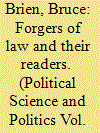

|
|
|
| 10 |
ID:
130003
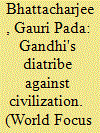

|
|
|
|
|
| Publication |
2014.
|
| Summary/Abstract |
Gandhi was opposed more to the English rule than rule by the Englishmen, and the nationalists sought to expel the Englishmen retaining the modern rule introduced by them. What was the drawback of the English rule? According to Gandhi their drawback was to bring modern civilization to India. Both the nationalists and the Mahatma sought to end British rule in India - the nationalists because it was foreign, and the Mahatma because it was modern. "It is not due to any particular fault of the English people," Gandhi asserted, "but the condition is due to modern civilization." "It is civilization only in name. Under it the nations of Europe are becoming degraded and ruined day by day," he added. And Gandhi was convinced that "if India copies England … she will be ruined." He thought that modern civilization "is eating into the vitals of the English nation," and therefore instead of blaming the English we should sympathize with them in their present distress caused by modern civilization. He was however confident that the English people would soon "cast off the evil" of modern civilization which, in his opinion, was not an "incurable disease."
|
|
|
|
|
|
|
|
|
|
|
|
|
|
|
|
| 11 |
ID:
102552
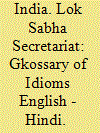

|
|
|
|
|
| Publication |
New Delhi, Lok Sabha Secretariat, 1997.
|
| Description |
v, 174p.
|
|
|
|
|
|
|
|
|
|
|
|
Copies: C:1/I:0,R:1,Q:0
Circulation
| Accession# | Call# | Current Location | Status | Policy | Location |
| 055674 | 423.1/IND 055674 | Main | On Shelf | Reference books | |
|
|
|
|
| 12 |
ID:
103811


|
|
|
|
|
| Publication |
London, Guardian Books, 2010.
|
| Description |
378p.
|
| Standard Number |
9780852652220, hbk
|
|
|
|
|
|
|
|
|
|
|
|
Copies: C:1/I:0,R:0,Q:0
Circulation
| Accession# | Call# | Current Location | Status | Policy | Location |
| 055920 | 423.1/MAR 055920 | Main | On Shelf | General | |
|
|
|
|
| 13 |
ID:
098148


|
|
|
| 14 |
ID:
112446
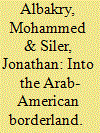

|
|
|
| 15 |
ID:
190091
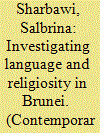

|
|
|
|
|
| Summary/Abstract |
The inexplicable link between the Malay language and Islam has been well-documented in Malaysia. In Brunei, however, this association has not been made explicit and could only be inferred through the state’s stance of utilising only the Malay language for Islamic-related matters, most conspicuously in the Islamic education curriculum. While this practice has been in place since the early days of Islamic education in the country, the changing linguistic situation in Brunei, where English is now more popular than Malay among the younger generation, may require some rethinking of this practice. An earlier study investigating the issues of language and religion in Brunei has found that those who are more English-inclined do not identify strongly with the Muslim identity as their Malay-leaning counterparts. Taking its cue from those findings, the present study extends the investigation in two ways: one, by adding the social variables age, gender and educational background in its analysis; and two, by focusing on the notion of religiosity rather than on religious identity alone. The findings show that age and language proclivity are both predictors of religiosity with older Bruneians displaying greater religiosity than the younger ones. Language also plays a factor such that those who are predisposed to using more English than Malay have fewer manifestations of practices aligned to the Islamic teaching. Gender and educational level, however, have low factor loadings and are not contributory to the measurement of religiosity.
|
|
|
|
|
|
|
|
|
|
|
|
|
|
|
|
| 16 |
ID:
141568
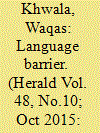

|
|
|
| 17 |
ID:
163113
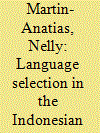

|
|
|
|
|
| Summary/Abstract |
In the post-New Order era, the use of English in Indonesia is noticeably increasing, particularly in otherwise Indonesian popular print texts, a domain where language selection is evident and publicly accessible. The appearance of English in Indonesian popular texts is linguistically known as code-switching, called bahasa gado-gado in the Indonesian context. Although noticeably increasing, English is still unfairly treated by many Indonesians and by the government as a foreign language that carries the “West” ideology. In other words, English not only functions as a linguistic resource but also as a language of Otherness that may carry some Western ideologies for many Indonesians. In fact, the juxtaposition of English and Indonesian in otherwise Indonesian speech acts still receives social censure or is seen as an interference to Indonesian-ness. Using an interpretive textual analysis, I show that code-switching with special reference to English effectively functions to express the overt love expressions and to project one’s socio-cultural hybridity and lingustic proficiency.
|
|
|
|
|
|
|
|
|
|
|
|
|
|
|
|
| 18 |
ID:
108315
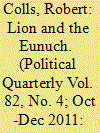

|
|
|
|
|
| Publication |
2011.
|
| Summary/Abstract |
The Lion and the Eunuch challenges the failures of British politicians to adequately understand the complexities, and the subtleties, of British national identity, and goes on to define it for them. It also explains reasons for our current confusions over who we are in the world. In 1940 Orwell wrote The Lion and the Unicorn as a rallying cry for a richly identifying country that was still able to imagine itself, and re-imagine itself, as the need arose. This essay suggests that without a radical change of government policy and thought, that power will continue to decline with far reaching consequences for the peoples of these islands.
|
|
|
|
|
|
|
|
|
|
|
|
|
|
|
|
| 19 |
ID:
138990
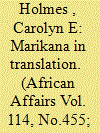

|
|
|
|
|
| Summary/Abstract |
This article attempts to understand how print cultures servicing different language communities fuel nationalisms that are not coterminous with a nation state. In the tradition of scholars like Benedict Anderson, it examines the connections between nationalism and print culture, but with reference to a single important event: violence at the Marikana mine. These events constituted the largest act of lethal force against civilians in the post-apartheid era. The South African press in three languages – Afrikaans, isiZulu, and English – covered the violence that erupted at the Lonmin mine in Marikana in mid-August 2012. Using original translations of daily newspapers and quantitative content analysis, the article assesses the differences among the various print media outlets covering the event. It finds that news coverage varied significantly according to the language medium in three ways: attribution of action, portrayal of sympathy and blame, and inclusion of political and economic coverage in the aftermath of the violence. These variations in coverage coincided with differences between reading publics divided by race, class, and location. The article argues that the English-language bias of most media analysis misses key points of contestation that occur in different media, both within South Africa, and throughout the post-colonial world.
|
|
|
|
|
|
|
|
|
|
|
|
|
|
|
|
| 20 |
ID:
117088
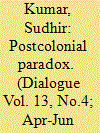

|
|
|
|
|
|
|
|